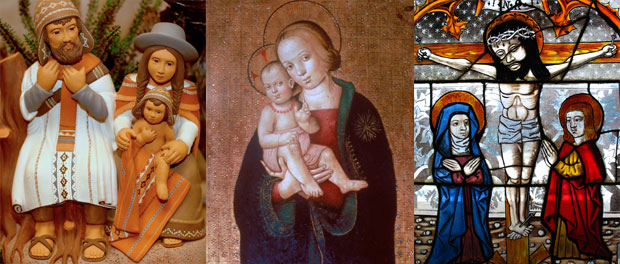In many discussions of Ignatian indifference by Jesuit colleagues, the paradigmatic stories revolve around leaving behind jobs, projects, and relationships for the sake of mission. But I struggle to make sense of indifference in that way, since I live the life of a layperson where my intimate relationships are long-term. I’ve been married for 25 years, am the mom of two, and my closest friendships span many years. If life is not that of a soldier “on the road,” and instead our closest relationships are an extension of “home,” then what might indifference look like?
Mary can be a model of indifference in the context of long-term relationship. She exhibits two virtues needed for the freedom of continued intimacy over time: fidelity and flexibility as a response to change. When we are flexible, we have the freedom to let go of particular moments or phases of relationships while still continuing in the faithfulness that love requires.
When the angel first asks Mary if she will bear God’s son, she responds with faith, although she also feels confusion. Mary has no idea of what this life that she has promised to God will entail, yet her promise does not require knowing in advance so much as adapting to the pushes and pulls of changing relationships. As Jesus grows older, and Mary witnesses his growth, ministry, and finally his death and Resurrection, Mary remains faithful. But along with this fidelity is an ability to let go of different times in her relationship to her son. For example, when she and Joseph leave Jerusalem only to find Jesus has stayed behind in the Temple, they must learn anew to love a dramatically changed Jesus. Mary’s faithfulness is not limited to her family relationships; she is also a central presence to the disciples both in sorrow at the foot of the Cross and in the joys of Pentecost.
This fidelity and faithfulness can also be qualities that we can cultivate in long-term relationships. Moms know well that being a parent is a life filled with family fun and laughter and also putting up with the temper tantrums of toddlers or the sulking of teenagers. My husband and I find ourselves in periods of both mutual delight and boredom, while adapting over the years to the changes of being newlyweds, parents, or now, almost-empty nesters. My best friend and I relate differently now that she is married, but there are new possibilities for how we relate now married woman to married woman. Here the interior freedom to live out a life of love is found in flexibility within the context of a deeper, long-term fidelity.
Then there is heartbreak. Mary’s heart is pierced when her son suffers and dies. Loss is a part of life. Family members can die, friendships can be broken, or we can suffer betrayals. Here, too, Mary is a model. Mary loses Jesus not once, but twice, in his death and then again when he ascends into heaven, leaving her behind. Still, Mary remains faithful to God and does not abandon her faith. Instead, these piercings open her heart to greater compassion and faithfulness to others. Mary stands by us just as she stood faithfully at the foot of the Cross. Fidelity, flexibility, and faith are all parts of Marian indifference.

